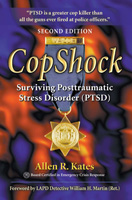
CopShock: Second Edition
Surviving Posttraumatic Stress Disorder (PTSD)
by Allen R. Kates, MFAW, BCECR
Drug Use
Drugs are often addictive and, like alcohol and
other substances, may mask other problems. Drug abuse can represent an inability
to express intense pain or feeling. It is a cry for help.
Illegal drug use is almost always a firing offense
for a law enforcement officer, so getting the department to pay for treatment is
not easy, but it is possible. Peer counseling units frequently send alcohol
abusers to confidential treatment facilities that provide drug treatment. Peer
counselors treating drug problems do not usually report to police
administrators.
Officers needing drug treatment may wish to ask peer
and treatment center counselors about confidentiality. No matter the response,
drug abusers must seek treatment. Without help, their lives and the lives of
those they care about are endangered.
Some of the following sources apply equally to drug and alcohol abuse.
Co-Anon Family
Groups
Co-Anon Family Groups are a fellowship of men and
women who are husbands, wives, parents, relatives or close friends of someone
who is chemically dependent. The website features information regarding the
problem and the solution via the twelve-step program, as well as an online
e-mail meeting for members all over the world. While most of the members come
from the U.S., Co-Anon is reaching Europe, North, Central and South America, and
countries on all other continents. The Meeting Directory currently lists
face-to-face meetings spread across the U.S. and Canada.
Go to: http://www.co-anon.org. Write:
Co-Anon Family Groups, World Services, P.O. Box 12722, Tucson, AZ 85732-2722.
Phone: 800-898-9985.
Cocaine Anonymous World
Service Organization (CAWSO)
Using a twelve-step program,
Cocaine Anonymous (CA) is open to anyone with the desire to stop using cocaine,
crack and all other mind-altering substances. The website provides a self-test
for cocaine addiction and listings and websites for CA groups in the U.S. and
other countries.
Go to: http://www.ca.org.
Write: CAWSO, P.O. Box 492000, Los Angeles, CA 90049-8000 USA. Call the National
Referral Line toll-free: 800-347-8998. Phone: 310-559-5833.
Drug Rehab
DrugRehab.com is an amazing, user-friendly web resource, dedicated to the treatment of addiction, substance abuse, eating disorders and mental health issues. If you are looking for help with your addiction, this is the best website I've ever seen for this purpose. It's extremely well organized and supportive.
Go to: http://www.drugrehab.com
Nar-Anon Family
Group
For friends and family of drug addicts, this recovery
group provides a forum for expressing the pain of watching someone they love
suffer with addiction.
Go to: http://nar-anon.org. To
reach groups in the U.S. and other countries, consult the telephone book or call
their head-quarters at 800-477-6291. Write: Nar-Anon F. G. Headquarters, Inc.,
22527 Crenshaw Blvd., #200B, Torrence, CA 90505.
Narcotics Anonymous
(NA)
NA is an international association of recovering drug
addicts who share personal experiences and solutions. Holding meetings in
seventy countries, it follows a twelve-step program that focuses on “spiritual
awakening.” NA’s website provides much information about groups in every state
and many countries.
Go to: http://www.na.org.
Write: NA, World Service Office, P.O. Box 9999, Van Nuys, CA 91409. Call:
818-773-9999.
For groups in Europe, write: NA, WSO, 48 Rue de l’Éte/
Zomerstraat, B-1050 Brussels, Belgium. Phone: 32-2-646-6012. Fax:
32-2-649-92239.
National Council On Alcoholism
And Drug Dependence (NCADD)
With more than one hundred
councils in the U.S., NCADD provides education, help and hope in the fight
against chronic alcoholism and drug addiction. Online, the group provides health
information, an intervention network, prevention programs, resources and a
referral guide.
Go to: http://www.ncadd.org.
Write: NCADD, 244 E. 58th Street, 4th Floor, New York, NY 10022. Call:
212-269-7797. Toll-free 24-hour referral Hope Line: 800-622-2255.
Web of
Addictions
Website creators Andrew L. Homer, Ph.D., and Dick
Dillon, are very concerned about “the appalling extent of misinformation about
abused drugs on the Internet, particularly on some Usenet Newsgroups.”
Their fact sheets cover alcohol abuse and many drugs including amphetamines,
barbiturates, caffeine, cocaine, hallucinogens, heroin, LSD, marijuana,
nicotine, opiates, steroids and tranquilizers.
Go to: http://www.well.com/user/woa.